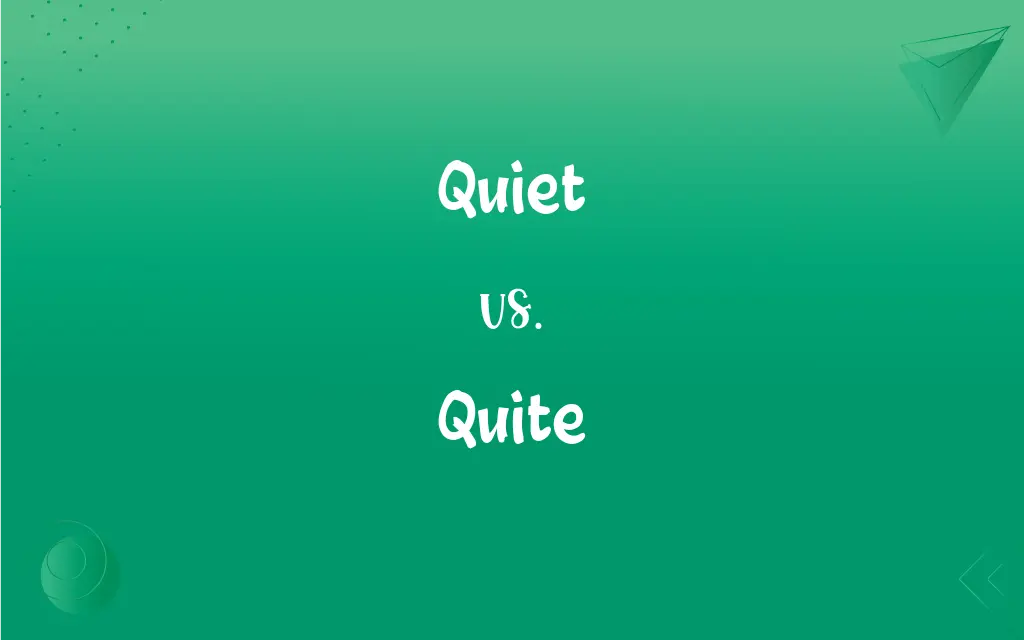Quiet vs. Quite: What's the Difference?
Edited by Janet White || By Harlon Moss || Updated on October 20, 2023
"Quiet" refers to a lack of noise or calmness, while "quite" is an adverb often used to emphasize or modify an adjective or adverb.

Key Differences
"Quiet" primarily denotes an absence of sound or a calm demeanor. It can describe environments, situations, or personalities where there's minimal noise or disturbance. For instance, a "quiet" room would be one without loud noises. On the other hand, "quite" is versatile in its usage. It's an adverb that can mean "completely," "to a considerable extent," or sometimes "rather."
When thinking of "quiet," one might visualize serene landscapes, peaceful moments, or individuals who speak softly. This term frequently relates to external circumstances, such as a "quiet" morning where birds might be the only audible sound. In contrast, "quite" modifies other words, amplifying or sometimes diminishing their intensity. For example, saying a book is "quite interesting" emphasizes its intriguing nature.
Using "quiet" in conversation usually points to sonic levels or the intensity of actions and behaviors. Telling someone to be "quiet" is requesting them to lower their voice or reduce noise. However, "quite" functions differently. In a statement like "It's quite cold today," "quite" underscores the degree of coldness.
In summary, "quiet" and "quite" serve different grammatical and contextual roles in English. While "quiet" pertains to calmness or silence, "quite" acts as an intensifier or modifier, refining the meaning of the words it accompanies.
Comparison Chart
Part of Speech
Adjective (mainly), Noun
Adverb
ADVERTISEMENT
Primary Meaning
Lack of noise or calmness
To a considerable extent or degree
Use in a Sentence
Describes absence of disturbance
Modifies or emphasizes an adjective or adverb
Grammatical Function
Descriptive
Intensifying or modifying
Context
Pertains to sound levels or calmness
Relates to the degree or extent of something
Quiet and Quite Definitions
Quiet
Free from noise or uproar.
The library was wonderfully quiet.
ADVERTISEMENT
Quite
To a degree or extent.
It's quite cold outside.
Quiet
Calm, peaceful, and untroubled.
He had a quiet confidence about him.
Quite
Completely or entirely.
The project is quite finished.
Quiet
Lacking in activity or bustle.
It was a quiet day at the market.
Quite
Actually or truly.
That's quite a different matter.
Quiet
Said in a soft or gentle voice.
She spoke in a quiet tone.
Quite
To a moderate extent.
I'm quite tired, but I can still go on.
Quiet
Not drawing attention to oneself.
He was a quiet student, often lost in his thoughts.
Quite
Used for emphasis.
The view is quite spectacular.
Quiet
Making or characterized by little or no noise
A quiet library.
A quiet street.
A quiet, well tuned engine.
Quite
To the greatest extent; completely
Quite alone.
Not quite finished. See Usage Note at perfect.
FAQs
How is "quiet" used as a verb?
As a verb, "quiet" means to make or become silent or calm.
What does "quiet" mean as an adjective?
As an adjective, "quiet" means having little noise or disturbance.
Can you provide a sentence with "quiet" as an adjective?
"The library is a quiet place to study."
Can you give a sentence where "quiet" is used as a verb?
"Please quiet the children so we can start the presentation."
How can "quiet" be used as a noun?
As a noun, "quiet" refers to the absence of noise or the state of tranquility.
How about a sentence using "quiet" as a noun?
"After the storm, there was a strange quiet over the town."
How do you pronounce "quiet"?
It's pronounced as /ˈkwaɪ.ət/.
Is "quite" similar to "rather"?
Yes, in many contexts, "quite" and "rather" can be used interchangeably, like "It's quite cold" or "It's rather cold."
What does "quite" mean?
"Quite" generally means to a considerable extent or degree. However, its exact meaning can vary depending on context.
What part of speech is "quiet"?
"Quiet" can be an adjective, noun, or verb, depending on its use in a sentence.
How do you use "quite" in a sentence?
"She's quite talented at playing the violin."
What part of speech is "quite"?
"Quite" is an adverb.
Can "quite" mean "completely" or "entirely"?
Yes, in some contexts, "quite" can mean completely, as in "The book is quite interesting."
Is "quite" always positive?
No, its tone can be neutral or vary with context. For example, "It's quite a challenge" doesn't necessarily convey a positive sentiment.
Are "quiet" and "silent" synonyms?
They are close in meaning, but "silent" often means completely free from sound, while "quiet" implies low sound or subdued noise.
How do you pronounce "quite"?
It's pronounced as /kwaɪt/.
Can "quite" be used for emphasis?
Yes, it can be used to emphasize an adjective or adverb, like "quite lovely" or "quite quickly."
Is "quite" formal?
"Quite" can be used in both formal and informal contexts.
Does "quite" have the same meaning in American and British English?
Mostly, but there are subtle differences. In British English, "quite" might mean "fairly" or "somewhat," whereas in American English, it often leans more towards "very" or "completely."
What is the opposite of "quiet"?
The opposite can be "loud" or "noisy."
About Author
Written by
Harlon MossHarlon is a seasoned quality moderator and accomplished content writer for Difference Wiki. An alumnus of the prestigious University of California, he earned his degree in Computer Science. Leveraging his academic background, Harlon brings a meticulous and informed perspective to his work, ensuring content accuracy and excellence.
Edited by
Janet WhiteJanet White has been an esteemed writer and blogger for Difference Wiki. Holding a Master's degree in Science and Medical Journalism from the prestigious Boston University, she has consistently demonstrated her expertise and passion for her field. When she's not immersed in her work, Janet relishes her time exercising, delving into a good book, and cherishing moments with friends and family.































































